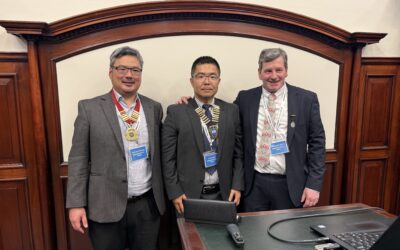On 20th December 2023, the Aberdeen ICorr Branch were guests of IMechE for a Joint Event at the Sandman Hotel in Aberdeen. This end of year Celebration that was very well attended with around 60 guests and was chaired by Steve Cromar CEng, FIMechE, IMechE Aberdeen Chair. The evening commenced with a welcome Hot Buffet Dinner, which was an excellent choice for a cold winter night.
![]()
Tom Baxter BSc (Hons), FIChemE.
Tom Baxter a Chemical Engineering Consultant and founding member of the Hydrogen Science Coalition spoke on ‘Future Energies and Greenhouse Gas Reduction’.
Tom graduated from Strathclyde University in 1975 with a B.Sc. in Chemical Engineering (first class honours) and is a Fellow of the IChemE. He started his career with ICI Petrochemicals, moved to fine chemicals with the Swiss company Ciba-Geigy, before taking a position as a process engineer in 1980 with BNOC (British National Oil Corporation). Through privatisation and acquisitions, BNOC became Britoil, then BP. Here he worked as an operations engineer, a development engineer, and research manager. In 1991 he left bp subsequently held positions with Altra Consultants as Technical Manager, as Technical Director with Genesis in 1998, and became the Aberdeen Business Unit Director in 2005. Since 2010 he became a Senior Fellow in the Chemical Engineering Department at Aberdeen University, which he helped establish, and since 2003, he has been a visiting professor of chemical engineering at Strathclyde University.
This coming decade is extremely important for achieving reductions, and individual impacts are great. During his most interesting talk, key themes discussed were ways to use less energy and an eye- opening debate on the misconceptions about renewable alternatives, (in terms of actual energy efficiency breakdown from production through to final distribution), which was considered in great detail. Overall, electrification came out as a very safe and efficient energy source.
Industrial Hydrogen Use
The Hydrogen (H2) does have some favourable characteristics, particularly buoyancy and no carbon monoxide, but has a low calorific value. Generally, hydrogen compares unfavourably overall with methane properties and has limited applications presently. For example, it requires three times the amount of compression power to move it along pipelines, and much talk of blending hydrogen was not seen as a good idea, although a 20% blend has been much promoted of late by others presenting to the Institute.
H2 is considered applicable for transport (although passenger car-dominated) and for some specialised industries, e.g., steel making. There have been recent question marks over some H2-driven projects. Pau (in France) cancelled its H2 buses, and the Redcar hydrogen project was recently cancelled.
Full-electric vehicles are seen as the most energy efficient for trains only for low train passenger routes in the UK (8oo kms out of 15000 kms) but there are lots of hydrogen miscellaneous uses. Batteries are the key to the future progression of renewables. Presently, the accurate hydrogen retail cost is not clearly defined.
Tom also spoke of https://www.h100fife.co.uk/ a parliamentary party group with interests including Cadent / Shell / others – Projected costs to 2050 however are not considered reliable.
![]()
Tom Baxter (Seated) Chemical Engineering Consultant and Hydrogen Expert Presented.
Domestic Hydrogen Use
Vested interests, e.g., Catapult and EUA have recently promoted hydrogen for heating. Tom reviewed the outcomes of Hy4Heat. Its mission was to establish if it was technically possible, safe, and convenient to replace natural gas (methane) with hydrogen in residential and commercial buildings. Through a QRA study, they found that hydrogen was inherently less safe than methane, with three times as many potential events. Hydrogen usage requires more safety features and is 40% less energy efficient overall. Electric energy provides greater wattage.
Summary
Generally, with renewables, more government support is needed so as to give more headroom and the opportunity to recover capital costs over a longer period of time. Tom Baxter was extremely knowledgeable and provided a most interesting talk.
For more information refer www.h2sciencecoalition.com
Hydrogen Science Coalition | Bringing an evidence based viewpoint into the political discussion on hydrogen (h2sciencecoalition.com)
![]()
Members of the Aberdeen ICorr Committee, with New Member Stephanie Okoye Second from Left, with Guest Shukun Liu (Oceaneering) Far Right.


